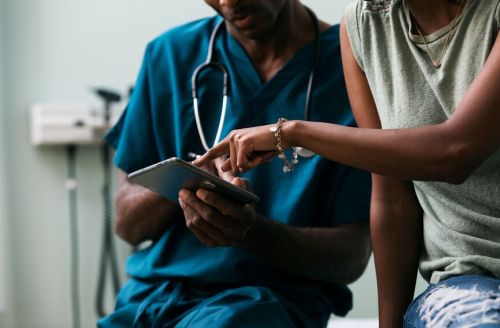Breast cancer has long been on people’s radars, but the BRCA gene? Not so much. Despite having been discovered in the mid-1990’s, the term didn’t become part of the national conversation until Angelina Jolie revealed in 2013 that she’d had a preventative double mastectomy after learning that she had a BRCA1 gene mutation.
Since then, of course, we have a lot more understanding about the gene (technically two: BRCA1 and BRCA2) and how a mutation of it can majorly affect a person’s risk of cancer. Companies such as 23andMe offer at-home testing kits so people can more easily find out if they have certain BRCA gene mutations (although the test only tests for three out of the 1,000 known variants that are associated with cancer). Non-celebs have opened up about their own preventative mastectomies inspired by a positive BRCA testing result. The government very recently changed its guidelines to widen the pool of people who should be screened for potential BRCA testing. It’s become a huge focus of breast cancer awareness and prevention.
BRCA literally stands for “BReast CAncer gene,” so it makes sense that we think of a person’s breast cancer risk when we talk about BRCA gene mutations. The thing is, though, that harmful BRCA mutations can impact a person’s risk of developing several other cancers—including pancreatic cancer and prostate cancer—and they’re just less talked about.
How the BRCA gene works (and when it doesn’t)
Everyone has two copies of BRCA1 and two copies of BRCA2: one from mom and one from dad. These genes produce tumor suppressor proteins, so their job is literally to “prevent a cancer from forming,” explains Joy Larsen Haidle, MS, LGC, a genetic counselor at North Memorial Health Cancer Center in Robbinsdale, Minnesota, and a former president of the National Society of Genetic Counselors (NSGC).
However, some people inherit a copy (or copies) that don’t work properly. “There’s an error in the genetic code that we call a mutation,” says Jill Stopfer, MS, LGC, associate director of genetic counseling at Dana-Farber Cancer Institute and an adjunct associate professor in the School of Health and Rehabilitation Sciences at the MGH Institute of Health Professions. “Someone is born with that [mutation], usually inherited from a mother or a father, and then they live their life with higher-than-average cancer risks.”
According to the National Cancer Institute, about one in 400 people has a pathogenic variant in either their BRCA1 or BRCA2 gene. Certain aspects of a family’s cancer history, as well as Ashkenazi Jewish ancestry, can put someone at a much higher risk of a mutation.
A BRCA1 or 2 mutation doesn’t mean someone’s definitely going to develop cancer, “but they have sort of a chink in the armor, if you will,” explains Stopfer. Take breast cancer, for example: While about 12.8 percent of women will develop breast cancer over the course of their lifetimes, research has found that about 72 percent with a harmful mutation in BRCA1 and about 69 percent with a harmful mutation in BRCA2 will develop breast cancer by the time they turn 80.
BRCA gene mutations and non-breast cancers
However, despite the emphasis on breast cancer risk with BRCA, the gene’s mutation is associated with an increased risk of various other cancers, such as ovarian cancer. While only about 1.3 percent of women get ovarian cancer, about 44 percent of women with a harmful BRCA1 mutation and about 17 percent with a harmful BRCA2 mutation will develop ovarian cancer by age 80.
That can also put a person with a BRCA1 or BRCA2 gene mutation at risk of fallopian tube cancer and primary peritoneal cancer, since they’re related to ovarian cancer. “Fallopian tube and primary peritoneal [cancer] are in the same spectrum as ovarian [cancer],” says Larsen Haidle. “[In the] medical community, we know that those things go together, but the lay public, they might not know that fallopian tube or primary peritoneal cancer is considered in the same category as ovarian.”
BRCA mutations have also been ID’d in people who have pancreatic cancer. Inherited gene mutations, including BRCA1 and 2 mutations, could be behind up to 10 percent of pancreatic cancer cases, according to the American Cancer Society. Pancreatic cancer in general is very rare—it makes up only 3 percent of all cancers—so the relative risk is still small, but it’s particularly hard to treat, so any risk is still concerning.
Men with BRCA mutations—generally BRCA2—have a small but increased risk of breast cancer (1 percent with BRCA1 mutation, 6 percent with BRCA2 mutation) and prostate cancer (8 percent risk by age 70). “Guys have an equal chance to inherit the BRCA1 and 2 mutations; it’s just the odds they would get sick because of it are significantly lower than for a woman in the family,” says Larsen Haidle.
Additionally, harmful BRCA2 mutations have been associated with a small but bumped-up risk of melanoma (less than a 5 percent increased risk over a person’s lifetime), says Stopfer. However, since melanoma in general is pretty rare (it makes up about 1 percent of all skin cancer diagnoses), the overall risk of a person with a BRCA2 mutation getting melanoma is still very low, according to the University of California, San Francisco’s Helen Diller Family Comprehensive Cancer Center.
Being proactive about potential risk
This is definitely a lot to take in. But the point of all this intel isn’t to scare people who know they have BRCA1 or BRCA2 gene mutations—it’s to help them understand their unique risks so they can set themselves up with the appropriate preventative screenings.
As mentioned, these mutations are rare. Per the new screening guidelines released over the summer, here’s how to know if you should consider getting tested for BRCA gene mutations:
- You have a close female relative (mom, sister, daughter) who has had breast, ovarian, or related cancers (peritoneal or tubal cancers)
- You have had breast, ovarian, or related peritoneal or tubal cancers
- Your ancestry is associated with increased risk of BRCA gene mutations (such as Ashkenazi Jewish ancestry)
It’s also a good idea for anyone to understand their family’s history with cancer, since family history can also be a risk factor for cancer regardless of whether they have a BRCA mutation. Things Stopfer says genetic counselors often ask: “Are there multiple generations of cancer, indicating something is hereditary? Do we see cancers occurring at earlier-than-typical ages? So, for example, the average woman with breast cancer is usually over the age of 50; do we see women in the family who have breast cancer in the 30s or 40s? Do we see people in the family with multiple cancers themselves? …All of those are clues—the early ages of onset, multiple generations, multiple primary cancers—that might indicate there’s higher-than-average risk in the family.”
If you’re unsure about what’s what in your family, the upcoming holidays could be a good time for a chat, says Larsen Haidle. “Nowadays we encourage people to ask their relatives, ‘Did you have your ovaries or uterus removed for any reason?’ Because if somebody had that surgery done, they would have reduced their risk of developing certain cancers, and that’s valuable for the next generation to know,” she says. Bright Pink, a nonprofit dedicated to early detection and prevention, offers helpful tools—such as a family health history form and a conversation guide—to help you gather the relevant info from your relatives.
If you test positive for BRCA gene mutations or have worries about your risk and family history, chat with your doctor. “Have a low threshold to raise any concerns with your physician to talk about what you’re seeing in the family tree,” says Larsen Haidle. Based on your family history and personal risk factors, you may talk about genetic testing for your family and specific types of monitoring.
“We know that most people get recommendations for screening for cancer based on their age and their gender—so every 50-year-old woman is told, ‘Here are the screening guidelines for you,’ and if you are a 60-year-old man, ‘Here are the screening guidelines,’” says Stopfer. “But the truth is, there may be, in some families, the need to do things a little bit differently, and sometimes that arises based on a careful assessment of the family history.”
Good news: Breast cancer is less fatal than it was a decade ago. And here’s what breast cancer survivors should know about the FDA’s proposed breast implant warnings.
Sign Up for Our Daily Newsletter
Get all the latest in wellness, trends, food, fitness, beauty, and more delivered right to your inbox.
Got it, you've been added to our email list.











